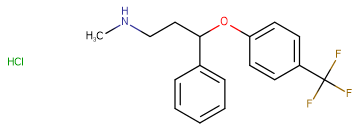
Fluoxetine hydrochloride
CAS No. 56296-78-7
Fluoxetine hydrochloride( LY110140 )
Catalog No. M15048 CAS No. 56296-78-7
Fluoxetine HCl is an antidepressant of the selective serotonin reuptake inhibitor (SSRI) class.
Purity : >98% (HPLC)
 COA
COA
 Datasheet
Datasheet
 HNMR
HNMR
 HPLC
HPLC
 MSDS
MSDS
 Handing Instructions
Handing Instructions
| Size | Price / USD | Stock | Quantity |
| 25MG | 43 | In Stock |


|
| 50MG | 58 | In Stock |


|
| 100MG | 74 | In Stock |


|
| 200MG | 133 | In Stock |


|
| 500MG | 227 | In Stock |


|
| 1G | Get Quote | In Stock |


|
Biological Information
-
Product NameFluoxetine hydrochloride
-
NoteResearch use only, not for human use.
-
Brief DescriptionFluoxetine HCl is an antidepressant of the selective serotonin reuptake inhibitor (SSRI) class.
-
DescriptionFluoxetine HCl is an antidepressant of the selective serotonin reuptake inhibitor (SSRI) class.(In Vitro):Fluoxetine hydrochloride (LY 110140) blocks the downregulation of cell proliferation resulting from inescapable shock (IS) of hippocampal cell. Fluoxetine increases the number of newborn cells in the dentate gyrus of the hippocampus of adult rat. Fluoxetine also increases the number of proliferating cells in the prelimbic cortex. Fluoxetine accelerates the maturation of immature neurons. Fluoxetine enhances neurogenesis-dependent long-term potentiation (LTP) in the dentate gyrus. Fluoxetine, but not citalopram, fluvoxamine, paroxetine and sertraline, increases norepinephrine and dopamine extracellular levels in prefrontal cortex. Fluoxetine produces robust and sustained increases in extracellular concentrations of norepinephrine and dopamine after acute systemic administration. (In Vivo):Fluoxetine hydrochloride (LY 110140) treatment also reverses the deficit in escape latency observed in animals exposed to inescapable shock in adult male Sprague-Dawley rats. Fluoxetine (5 mg/kg) alone increases cell proliferation in the dentate gyrus. Coadministration (fluoxetine 5 mg/kg + olanzapine) also significantly increases the number of BrdU-positive cells compared with the control group. Fluoxetine combined with Olanzapine produces robust, sustained increases of extracellular levels of dopamine ([DA](ex)) and norepinephrine ([NE](ex)) up to 361% and 272% of the baseline, respectively, which are significantly greater than either drug alone.
-
In Vitro——
-
In Vivo——
-
SynonymsLY110140
-
PathwayEndocrinology/Hormones
-
Target5-HT Receptor
-
Recptor5-HT| Sert (Sodium-dependent)
-
Research AreaNeurological Disease
-
Indication——
Chemical Information
-
CAS Number56296-78-7
-
Formula Weight345.79
-
Molecular FormulaC17H18F3NO·HCl
-
Purity>98% (HPLC)
-
SolubilityEthanol: 69 mg/mL (199.54 mM); Water: 4 mg/mL (11.56 mM); DMSO: 69 mg/mL (199.54 mM)
-
SMILESCl.CNCCC(OC1=CC=C(C=C1)C(F)(F)F)C1=CC=CC=C1
-
Chemical Name——
Shipping & Storage Information
-
Storage(-20℃)
-
ShippingWith Ice Pack
-
Stability≥ 2 years
Reference
1.Richman A, et al. Epilepsy Res. 2007 Apr;74(1):19-27.
molnova catalog



related products
-
CART (62-76) (rat, h...
Cocaine- and amphetamine-regulated transcript (CART) peptide fragment that inhibits food intake. Attenuates NPY-induced feeding and decreases food intake in food-restricted goldfish, and induces anxiogenic-like effects in elevated plus-maze test in rats. Modulates the activity of striatal noradrenergic, and corticostrial and hypothalamic serotoninergic systems, with no major effect on dopaminergic pathways in rat brain.
-
6-fluoro-DL-Tryptoph...
6-fluoro-DL-Tryptophan is an inhibitor of serotonin (5-HT)?synthesis.
-
Vabicaserin hydrochl...
Vabicaserin hydrochloride is a selective agonist of 5-hydroxytryptamine 2C (5-HT2C) receptor (EC50: 8 nM).



 Cart
Cart
 sales@molnova.com
sales@molnova.com


